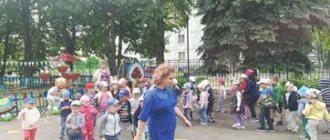How are children's matinees in kindergarten useful for children?
First of all, the task of matinees, as well as any holidays in general, is to add variety to the usual and monotonous way of life of children. Add positive emotions, colors and joy to it.
If we talk about the practical component of children's matinees, we can highlight several main pedagogical functions that they perform.
Which ones?
- motivation for creative activity. To perform at the matinee, children are taught to sing, dance, tell something, and so on. All this stimulates their creative development.
- Strengthens the relationship between parents and children. Parents most often also take an active part in preparing for the matinee, so their relationship is especially active during this period. They learn poetry together, choose an outfit for a performance, and so on.
- rally children. In addition to individual performances, children perform together at matinees. A common choir, rehearsals of skits, joint dancing, all this requires preparation and coordination. To do this, children need to learn to interact with each other.
Children's matinees are, as a rule, long-term joint work of children, their parents and teachers. During the preparation period and during the performance, many important tasks are solved.
Analysis of types of holidays and entertainment in kindergarten
Olga Zhukova
Analysis of types of holidays and entertainment in kindergarten
In people's lives there is an alternation of everyday life and holidays , which are in many ways opposed to each other.
For children, the holiday has special meaning. K. D. Ushinsky notes that a holiday for a child is not at all the same as for an adult.
Holidays and entertainment are part of the cultural and leisure activities of the preschool educational institution. Through controlled cultural and leisure activities of children, it is possible to develop the child’s general culture, his creative individuality, to form the foundations of his positive attitude towards others, a positive “I-concept”
etc.
Classifying children's holidays on the basis of the generally accepted festive culture of Russia , M. B. Zatsepina and T. V. Antonova define the following types of children's holidays :
1) folk and folklore - Christmastide, Kolyada, Maslenitsa, Krasnaya Gorka, spring-summer games and fun, Autumn;
2) state and civil - New Year, Defender of the Fatherland Day, Victory Day, Knowledge Day, City Day, etc.;
3) international – Mother’s Day, Children’s Day, International Women’s Day;
4) Orthodox - Christmas, Annunciation, Palm Sunday, Easter, Trinity, Intercession;
5) household and family – birthday, school graduation;
6) "fantasy holidays "
–
Festival of Soap Bubbles , Festival of Balloons , Paper Boats, etc.
N.A. Vetlugina recommends celebrating the New Year on May 1, March 8 in the form of festive matinees , and on February 23, Victory Day, in the form of thematic complex classes.
As O.P. Radynova notes, the holiday performs important functions only if systematic work on the musical education of children is carried out in the kindergarten
Objectives of cultural and leisure activities in kindergarten A. N. Zimina sees the following:
- give children joy and encourage them to be active;
- give vivid artistic musical impressions;
- instill interest and love for music, develop musical sensitivity and musical activity of the child.
Organizing a children's party , as Yu. I. Bratchikova writes, includes the following preliminary work:
1) careful selection of script and actors;
2) selection of musical and literary material according to the theme of the holiday and the age characteristics of the children;
3) learning musical and speech material with children and teachers;
4) conducting rehearsals;
5) production of costumes and scenery;
6) selection of soundtracks, special light and sound effects;
7) preparing treats.
The content of children's parties is very diverse and is represented by: dancing, singing, artistic expression, dramatizations of poems and fairy tales, performances of small plays, jokes, reprises, and surprise moments.
The decoration of the holiday includes decorations , costumes and attributes for children, music. It is advisable that children participate in the preparation of holiday
Each type of holiday has its own customs and traditions.
Thus, the festive program of public holidays usually consists of three parts:
1) the first part, short in time (5 - 7 minutes, includes the ceremonial entrance of smartly dressed children with flags, flowers, branches, etc., formations, reading of poems, performance of 1 - 2 songs;
2) the second part is longer. It consists of collective and individual performances of children and spectacular moments. Children perform songs learned in music classes. A special place here is occupied by folk songs, games, round dances and dances familiar to children.
This part can take the form of a concert in which different types of activities alternate, or part of the repertoire can be united by one theme. This part includes dramatizations, games, and surprise moments.
3) in the final part, the children’s attention is again drawn to the main idea of the holiday . The presenter once again congratulates everyone present on the holiday ; the children can read in chorus a quatrain dedicated to the holiday . The children leave to the cheerful march.
The New Year's script traditionally consists of three parts:
1) first part - children examine the colorfully decorated Christmas tree, read poetry, and dance in circles;
2) the second part is the culminating one. Here Father Frost and Snow Maiden appear, who continue to lead the matinee, conduct attractions, games, ask riddles, etc.;
3) the third part is the final one. Father Frost and Snow Maiden say goodbye to the children. After one or two mass dances (round dances)
Around the Christmas tree, children disperse into groups.
Holidays dedicated to farewell to kindergarten and seeing off children to school are distinguished by a warm atmosphere of friendly attention.
Children of the preparatory group perform their favorite songs, games, dances, watch performances by children from other groups, accept congratulations, flowers, and souvenirs from them. kindergarten workers and promise to do well at school.
Holidays dedicated to children's birthdays are usually held as a kind of family celebration.
To a child (group of children)
a small concert is dedicated, gifts are given (homemade items, drawings made by peers. Birthdays are best held in the afternoon and end with tea with cake and sweets.
In recent years, it has become a tradition in many preschool educational institutions to hold joint parent-child holidays .
Such a holiday , as E.V. Ogorodova notes, can consist of four parts:
1) the first part is a theatrical performance in which children, parents, and teachers can show their skills;
2) the second part is a general tea party, for which the table is set in accordance with the theme of the holiday ;
3) the third part – games and competitions for children and adults. Games can be active and didactic in nature, with musical, intellectual, comic and other content;
4) fourth part – reflection (summarizing the results of the holiday )
.
Holidays school year include more games and shows, since children have not yet had time to master a more complex repertoire.
We emphasize: every holiday (matinee, entertainment )
must be based on a well-thought-out scenario and be carefully prepared.
The script reflects the main idea of the holiday and does not allow the progress of the holiday to “scatter”
.
The scenario must correspond to the age capabilities of the children. It is necessary to take into account the musical and other creative skills of children for a specific period.
When working on a script, as M. V. Parkhomenko points out, it is necessary to take into account the following principles: accessibility, content, entertaining, entertaining , educational, full of movement, dynamism, “surprise”
.
It is recommended to adhere to the following rules:
- interesting story;
- the game as the basis of the holiday , or a single gaming theme of the holiday ;
- alternating spectacular moments with active actions of children;
— building a program on musical and speech material previously mastered with children;
- inclusion of motor and general developmental exercises , outdoor games;
- age-appropriate duration of the holiday (from 20 minutes for young children to 45 minutes for older preschoolers).
Much attention should be paid to the selection of musical material for the holidays .
Teacher (music director, educator, methodologist)
thinks over the theme, form
of the holiday , selects musical and literary material. Numbers for children should be selected according to their strengths and inclinations; children should enjoy participating in the holiday .
The host of the holiday is artistic , with good speech culture. He must have the skills to communicate freely with children and adults, since he is the one who creates a positive and friendly mood at the matinee.
The musical director ensures the full sound of musical works and their artistic performance, if possible. It should be remembered that a variety of vivid impressions can cause inhibition in children or, on the contrary, excessive mobility. In all unforeseen cases, the host must show restraint and resourcefulness in order to return the holiday to the right direction .
A good tradition is “seeing off the holiday ”
. In the music hall, decorations, costumes and attributes are left for games and performances.
Entertainment is one of the types of cultural and leisure activities of preschool educational institutions.
Entertainment – colorful moments that develop creative activity and enrich children with impressions. In addition, children in entertainment can show independence, gain confidence in their abilities, develop communication skills, personal qualities, etc.
Entertainment is classified , depending on the activity of children, into three types. These are entertainments in which children:
1) only spectators and listeners;
2) participate independently;
3) participate together with adults.
When organizing entertainment of the first type, children are involved in decorating the group, hall, and making invitation cards and attributes. In entertainment , where children are only spectators and listeners, a positive emotional mood is transmitted to them in the process of perception.
In the second type of entertainment, children themselves prepare numbers for performances, stage plays, act out roles, and participate in various games. This type of entertainment helps the teacher find something to do for each child.
The second type of entertainment makes it possible to include children more widely in the process of preparation and performance. They themselves prepare numbers for performances, stage performances, act out roles, and take an active part in various games. This type of entertainment allows the teacher to find something to do for each child, which has a positive effect on the formation of the foundations of an individual’s culture.
Third, a mixed type of entertainment allows children to expand their communication with adults and peers. in this type of entertainment .
Entertainment can be classified according to its content :
1) theatrical (puppet, shadow, finger theater, etc.)
;
2) educational (quizzes, Club of cheerful and resourceful people, etc.)
;
3) sports (outdoor games, relay races, attractions, competitions)
;
4) musical and literary concerts;
5) jokes, tricks, riddles, surprise moments.
Let's take a closer look at the last type of entertainment .
Jokes can be used during breaks between games, at holiday parties and entertainment .
Tricks that have something mysterious associated with them always arouse keen interest in children.
Surprises are unexpected and fun moments that evoke many positive emotions in children.
After celebrations and entertainment, it is extremely important to consolidate the impressions and knowledge acquired by children. Impressions of the holiday and entertainment can be captured in drawings, modeling, stories and conversations. Children repeat their favorite dances, songs, and actions of individual characters.
Thus, holidays and entertainment are integrated , aesthetic and social phenomena, significant events in the life of a kindergarten . The task of preschool teachers is to make the children's holiday and entertainment unforgettable , to leave a bright mark on the souls of the pupils.
Who invented children's matinees? ⠀
So, who and why invented matinees in the first place?
Initially, of course, the idea was conceived as a holiday for the children. A significant event is coming: the Autumn Festival, New Year, March 8th. All these dates are a good reason to arrange a treat, as well as to show off your talents, who is capable of what.
Matinees began to be held in kindergartens in the USSR. The traditions of holding matinees go back to Soviet times. Each matinee was a real costume ball. The brightest were New Year's, February 23, “Dad's Day” and March 8, “Mom’s Day.”⠀
Modern matinees are in no way inferior to Soviet ones. Although it all depends on the specific kindergarten. Now the focus is on really showing the kids' abilities and what they have learned.
It is important for parents and teachers to see the fruits of their work. Note what each child is more inclined to do, what skills need to be developed. ⠀ At RigaKids, they carefully look and listen to the talents of their students!
What are children's parties?
Children's matinees are small holidays in which so many emotions, children's experiences, and the work of educators and teachers are invested.
Such holidays in kindergarten took place in the first half of the day, between breakfast and lunch. That's why they got that name.
The task of matinees is to diversify the lives of children, to make it brighter and more interesting. Matinees primarily have a general emotional meaning, but also perform a number of different pedagogical functions.
What functions?
Methodological recommendations for organizing a New Year's holiday
Natalia Rudak
Methodological recommendations for organizing a New Year's holiday
New Year is always a fairy tale and an encounter with a miracle. This holiday is loved and celebrated by everyone. without holidays
Holidays are of great importance in a child’s life: they give a powerful positive emotional charge, allow them to escape from problems and relax. The New Year's holiday is a special event, all children and adults look forward to it. The holiday brings a lot of positive emotions and is designed to solve a number of educational problems.
Recommendations and methodological advice for those who organize a New Year's party
First of all, you need to familiarize yourself with the holiday , develop a preparation plan, and make a list of necessary props. Select games, competitions, mass songs and dances that will be used at the holiday . Do not forget to record the phonograms on separate media, sign and number the order in which the phonograms are performed. There are also basic rules that it is advisable to adhere to during the New Year holidays :
• you should not try to reach the maximum number of children; it is better to hold 2 Christmas trees with fewer children than one with more;
• you should not install a Christmas tree in the center of the hall, since children should see what is happening, the Christmas tree should not interfere with this;
• do not hold matinees in an undecorated room, the design gives positive emotions, the design that matches the scenario will look advantageous;
• do not force children to sit still throughout the holiday , alternate types of activities;
• do not plan to introduce too many heroes holiday
• it is imperative to give children the opportunity to express themselves through competition and games;
• if poetry reading is planned, then sit the children on chairs and let this part of the holiday take place like a concert ;
• transitions from one action to another should be smooth.
Stages of work on the holiday
1. Pre-planning.
2. Work on the script.
3. Preliminary acquaintance of children with the theme of the matinee.
6. Holding a matinee.
7. Summing up.
Well- organized holidays have a beneficial effect on the development of mental processes: memory, attention, create an excellent situation for the development of a child’s speech, for consolidating knowledge acquired in various classes, and contribute to moral education.
Methodological recommendations for organizing physical education and recreational work with preschool children Goal: to improve the level of knowledge of teachers in organizing physical education and recreational work, to study program requirements for physical education.
Methodological recommendations for preschool teachers on organizing work with parents of pupils Methodological recommendations for teachers of preschool educational institutions on organizing work with parents of pupils Comfortable.
Methodological recommendations for organizing art competitions Organizing a competition requires careful planning and preparation. The culmination of each competition is the awarding of the winners.
Methodological recommendations for organizing OD (classes) taking into account the Federal State Educational Standard for Educational Education. Methodological recommendations for organizing OD (classes) taking into account the Federal State Educational Standard for Educational Education. Education (in the broad sense of the word: upbringing, training and development).
Methodological recommendations for organizing health strengthening activities in a preschool institution Physical education is part of universal human culture. It covers those aspects of life and education that are of utmost importance.
Methodological recommendations for organizing meals in a preschool institution Municipal budgetary preschool educational institution "Kindergarten "Solnyshko" town. Gvardeyskoye”, Simferopol district of the Republic.
Methodological recommendations for organizing role-playing games in a preschool educational institution. The importance of role-playing games in the development of a preschooler. Preschool childhood is the most important period of personality development. During these years, the child acquires.
Methodological recommendations for the creation and organization of the activities of a children's television studio. Methodological recommendations for the creation and organization of the activities of a children's television studio on the basis of an additional education institution. Chapter.
Methodological recommendations for organizing the work of creating mini-museums in preschool educational institutions Museum pedagogy is one of the areas of preschool pedagogy that is rapidly developing. It should be noted that in recent years it has appeared.





